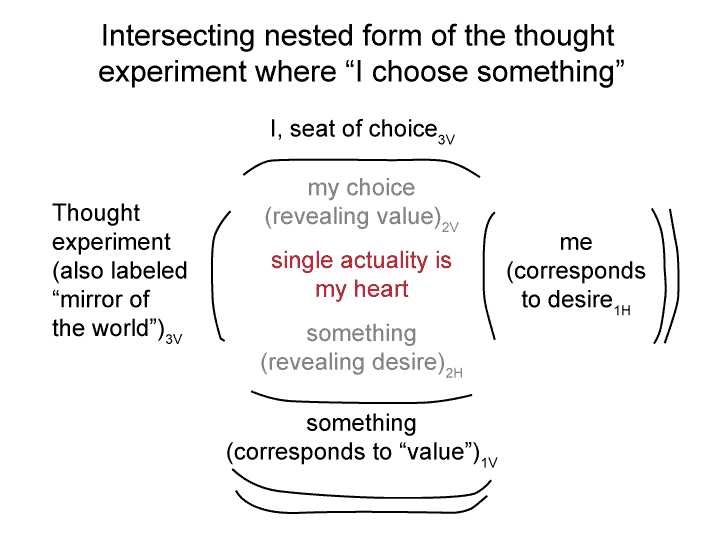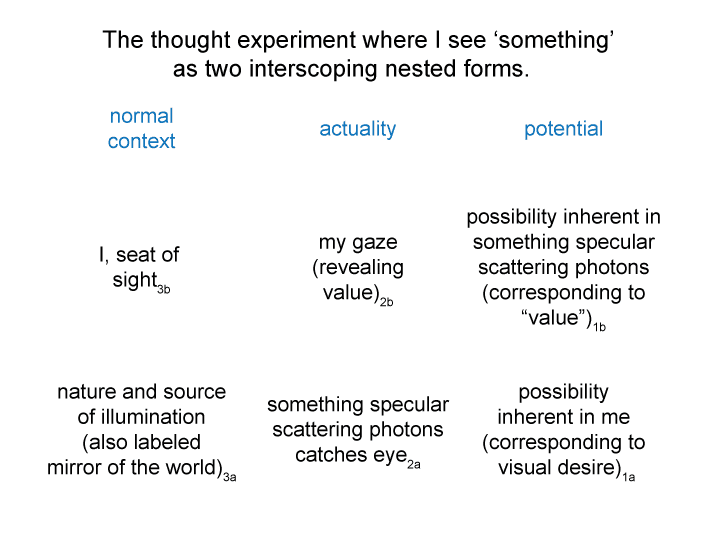Man and Sin by Piet Schoonenberg (1964) 2.3 HL
[I label that actuality “my heart2”.
Thoughts and deeds constitute the vertical nested form.
Obligations and exercises of the heart constitute the horizontal nested form.
The interscoping content and situation levels detach from their (assumed) perspective level.
They detach as an intersection.]
Man and Sin by Piet Schoonenberg (1964) 2.3 HK
[What happens when my values1b no longer touch base with the objects that reveal my desire2a?
The ongoing interscope no longer applies.
Thoughts3b(2b and deeds2b(1b)) no longer emerge from and situate obligations3a(2a and exercises of my heart2a(1a)).
My choice2b and something (that emerges from and situates me)2a congeal into a single contradiction-filled actuality.
I label that actuality “my heart2”.]
Man and Sin by Piet Schoonenberg (1964) 2.3 HJ
Summary of text [comment] page 83
[What happens when the something underlying my choice1b no longer equilibrates to the something2a emerging from and situating ‘the potentials inherent in me1a‘?]
Man and Sin by Piet Schoonenberg (1964) 2.3 HI
[Starting from a working interscope, disconnects are possible.
For example, the thought experiment3a or me1a may change.
Then, the something underlying my choice1b may no longer equivalent to the something2a emerging from and situating ‘the potentials inherent in me1a’.
My values1b no longer virtually emerge from and situate my desires1a.]
Man and Sin by Piet Schoonenberg (1964) 2.3 HH
[So, what is “desire1a”?
Something2a emerges and situates possibility1a in the normal context of a thought experiment3a.
“Desire1a” denotes an upwelling in me1a in regards to the thought experiment or mirror of the world3a.]
Man and Sin by Piet Schoonenberg (1964) 2.3 HG
[In the original interscope, a content-level ‘something2a emerges from and situates the potentials inherent in me1a. Then, a situation-level my choice2b emerges from and situates the potentials inherent in ‘something2a‘1b.
What happens when there are no disconnects?
Then, ‘something’ underlying my choice1b virtually emerges from and situates the potentials inherent in me1a.
It does so by identifying the something underlying my choice1b as the something that emerges from and situates the potentials inherent in me2a.
In short, when there is no disconnect, values1b virtually emerge from and situate desires1a.]
Man and Sin by Piet Schoonenberg (1964) 2.3 HF
[The corresponding interscope does not account for a disconnect between the situation and content levels.
The perspective level is assumed, not questioned.
A habit is a good example.
Questions arise only when failure becomes apparent and cannot be readily explained away.
Questions are equivalent to intersections.]
Man and Sin by Piet Schoonenberg (1964) 2.3 HE
Summary of text [comment] page 83
[What is going on?
In the intersection, there is a disconnect between my gaze2V and the way that my vision locks onto something that specular scatters photons2H.
I am hungry. I see a small red ball. I see an “apple”.
What I see is a contradiction.]


